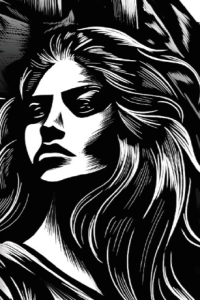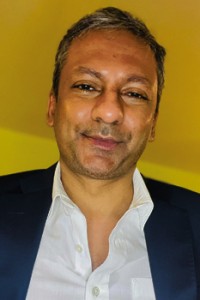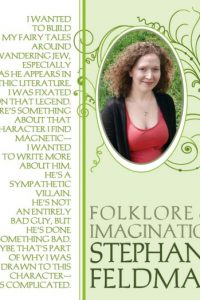James Patrick Kelly: Alterations

James Patrick Kelly was born April 11, 1951 in Mineola NY. He earned a BA in English Literature at the University of Notre Dame in 1972, and attended the Clarion Writers’ Workshop in 1974 and ’76. He began writing full time in 1977. In 2005 he joined the Stonecoast Creative Writing MFA program as an instructor.
Kelly’s professional career began with “Dea Ex Machina” for Galaxy (1975), followed by scores of stories for major anthologies and SF magazines. Major short works include Hugo winners “Think Like a Dinosaur” (1996) and “1016 to 1″ (1999); Nebula Award-winning novella Burn (2005, also a Hugo finalist); Hugo and Nebula Award finalists “Rat” (1986), “Itsy Bitsy Spider” (1997; also a Locus Award winner and Sturgeon finalist), “Undone” (2001), and “Plus for Minus” (2010); Hugo finalists “Bernardo’s House” (2003; also a Sturgeon Award runner-up), “The Best Christmas Ever” (2004); Nebula Award nominees “Saint Theresa and the Aliens” (1984), “Mr. Boy” (1990), “Standing in Line with Mister Jimmy” (1991), “Ninety Percent of Everything” (1999, with Jonathan Lethem & John Kessel), “Men Are Trouble” (2004), “Don’t Stop” (2007), and “Going Deep” (2009); Asimov’s Award-winner “The Prisoner of Chillon” (1985); Sturgeon Award honorable mentions “Heroics” (1987), “Dancing with the Chairs” (1989), and “Faith” (1989); Tiptree Award finalist “Chemistry” (1993); and Sturgeon and Tiptree finalist “Lovestory” (1998).
Some of his short fiction is collected in Heroines (1990), Think Like a Dinosaur and Other Stories (1997), Strange But Not a Stranger (2002), The Wreck of the Godspeed and Other Stories (2008) and Masters of Science Fiction: James Patrick Kelly (2016). New collection The Promise of Space is forthcoming. He co-edited several anthologies with John Kessel: Feeling Very Strange: The Slipstream Anthology (2006), Rewired: The Post-Cyberpunk Anthology (2007), The Secret History of Science Fiction (2009), Kafkaesque: Stories Inspired by Franz Kafka (2011), Digital Rapture: The Singularity Anthology (2012), and Nebula Awards Showcase 2012 (2012).
Kelly has also written a handful of novels: Messenger Chronicles Planet of Whispers (1984) and sequel Look into the Sun (1989); Freedom Beach (1985, with John Kessel); and Wildlife (1994). His latest novel, Mother Go, appeared as an audiobook original in July 2017.
Excerpts from the interview:
“The audiobook of my new novel Mother Go came out in July. I finished the book about a year before that and went in search of an agent, and found a very fine one, John Silbersack. We brought the book to market, but the marketing did not go as smoothly as I would’ve liked. Some people were not interested, and I don’t think it was the book – I think it was the market for science fiction. At one point we still had a couple of editors thinking about it, and Audible stepped up with an offer that was actually very nice, but it came with a six-month blackout where they wanted exclusivity for their audiobook. Not to read into their minds, but I think they were interested in being the owners of some things, instead of the reprinters. I worked with Steve Feldberg, who is a good friend. We’ve worked together on a lot of reprint projects, and now he’s edited my book. I hope he got some pleasure out of it, and he certainly was very good at it, but how many books does he edit? Usually he acquires a book that’s been published, and then passes it along to a narrator. He’s a sharp reader, and he made some good points, and I was pleased to do most of what he said.
“Publishing in audio first was kind of a risky move – I acknowledge that – and at the moment we still do not have a print publisher lined up. What I loved about the experience was, the time from Steve’s final offer to publication was just five months. That’s magazine turnover time, not book turnover. I just couldn’t resist. On top of which, I’m a huge Audible fan. Audible has been very good to me – I have a lot of stuff in their store.
“Cory Doctorow showed the way, and I had other friends like Mur Lafferty who directed me down the path that led to this audio opportunity. They pointed out that there were people self-publishing their novels who were not validated by the market, who weren’t necessarily published in magazines, or who didn’t have novel credits – I was the first one who had novel credits and some awards and some validation from the field to give my stuff away for free in audio. That was for my novella Burn, which won the Nebula Award. It was published by Tachyon, a wonderful small press, but publisher Jacob Weisman gave me permission to podcast it, with Chapter One going up on the day of publication, and then a chapter a week. 20,000 people downloaded it, so do the math. I think that’s why it won the Nebula Award. Combine how many copies Jacob published, and how many podcast listeners heard it, and it adds up to some buzz. At the Nebulas, Steve Feldberg came up, introduced himself, and said, ‘I’m from Audible. We really like this podcast you made, and we’re interested in putting you in the store.’ I was like, ‘I’m a total Audible head, I’ve been a subscriber since day one, but is my podcast of quality? You guys are professionals.’ He said, ‘Yours is pretty good, and better than some in our store.’ That was the beginning of a beautiful friendship. Eventually I ended up narrating 50 of my short stories for Audible.
“There is a sort of intimacy to narrating: ‘I’m whispering in your ear.’ It’s specifically different if an author can do that for his or her work. You’re not only listening to the story, you’re registering that this is the way it must have sounded to him in his head, or her head, when he was writing. There’s a certain value to that. Some people can’t do narration, but we live in a culture now for writers where you need something more to offer. It helps if you’re a charismatic speaker, or you’re the guy they always want on a panel, or you’re handsome as all get-out. None of those things actually work for me, but the charisma that I have is my reading. I teach at an MFA program, and I tell my students, ‘Find the other thing you can do, besides being a writer.’ There are talented, smart writers doing great work, but there are lots of them, so you have to find some way to stick out from the crowd.
“I turned down narrating Mother Go. It’s third-person, from the point-of-view of a young girl named Mariska who grows to womanhood, so I thought it would be better narrated by a woman. They found a wonderful narrator, January LaVoy, an actress working in New York. She does a lot of theater, she’s been in soaps and prime time network TV, and she does voices very well. There are accents in my book, and she does convincing male characters – every woman narrator does male voices, but it’s hard for any narrator to do a bunch of voices of the opposite sex well.
“I don’t know if this happens to you, but sometimes I’m reading and it’s boring, and I flip a page, just to see, does it pick up here? Lyrical description of the forest – who cares? One of the skill sets I have as a teacher and a writer is that I’m a speed reader. If I go into speed reading mode, I go very quickly. You can’t speed read and retain everything, so I love audio books because I have to slow down. If I’m asked to blurb something I will read it, but most of what I read for pleasure is on audio. Put your fiction on audio because I probably won’t read you otherwise! There are so many books I really want to read that aren’t out yet.
“I also write plays. When I work in the theater, my thought is, let the actors who are trained in this profession do their thing. I’ve seen bad productions of my plays, but mostly I discover something in the way actors interpret my words, and I think that’s one of the thrills of being a playwright: to see your own play, and hear your words spoken by other people. A good actor can convince me their reading is better than I thought the material was.
“There was always the question about whether Mother Go should be YA. The editors who read it said, ‘This isn’t really YA.’ But it starts with a young woman protagonist, and that makes it a peculiar book. Mariska is a young woman living on the Moon, and she’s the clone of a starship doctor who’s off on a mission. Mariska has never actually met her ‘mother,’ her original. She’s been brought up by a surrogate dad. She has a life and a boyfriend and she goes to high school, and she’s about to go to college to become a spacer, when her mom comes back and says, ‘We’re going to found a colony.’ It’s a one-way trip, like Elon Musk’s trip to Mars, only this is through a wormhole to another galaxy. They’re taking a very expensive starship full of colonists and they want her to go. Mariska, like any 14-year-old girl, says, ‘Who the hell are you? I’m your clone, but you were never here. You never changed my diapers, you never made me any birthday cakes, so why are you telling me what I need to do?’ Her story starts out with a very YA feeling, and she does something foolish and dangerous that thrusts her into the adult world. She hibernates, because as the clone of the starship officer, she has the ability to hibernate at will. She’s supposed to hibernate in a controlled situation, with the hibernation pod around her so she can be protected, but she decides, ‘Oh well. I’ll just hibernate for six months, Mom will go away, and all of my problems will be solved.’ Mariska does a very willful and foolish thing, and it thrusts her into the rest of the book where she’s in adult situations of terror, and she has to make decisions that will change her life and other people’s lives. She grows up very quickly, but the book does start with that high-school feel.
“Before I wrote this book, I was rereading Heinlein juveniles, not to study how Heinlein did it, but to look at my own past and figure out, what was it that made me want to be a science fiction writer? What warped me at an impressionable age and pointed me in this direction, instead of towards mysteries or sports stories? I wanted to write a contemporary book that had a young woman protagonist that was a hard science, near-future solar system-based space novel that would appeal to young women, because I wasn’t seeing a lot of hard SF about women. I like to think that much of the science in my book is what people laughingly call hard science. There’s no wormhole for us to go through yet, but everything else should work, more or less. I wanted to reach out to that young female audience. My daughter is now 36, and I never wrote a story for her, so in some ways I wrote the story I should’ve written, had I had the time and inclination when she was a kid. I would have loved for her to read this novel when she was young. I wanted to start out with a gateway to some young reader who could feel, ‘Woah, that’s kind of like me.’ Then Mariska’s world changes, in the same way many of our young women make a transition in high school to a much different world in college.
“Space is a young person’s domain because they’re going off to this colony, and they’re never coming back. Mariska fights against going, falls in love with a Martian, and eventually decides to go on this trip. All of the people going to the colony are in their twenties, because why would you send people in their forties or fifties on a 12-year mission, and then found a colony? They need to reproduce. Everyone on the crew is in their twenties, so it’s like a giant college/graduate school starship to another galaxy, with a few professor mom and dad types. They’re all sexually active in future ways where they’re not bound by some of the constraints that bind so many people in our times. They’re going to another galaxy. They’re not bringing kids. Kids will happen when they get to the colony. They’re not going to have a kindergarten on this spaceship. In a starship crew, there are no rugged individualists. You’re part of a team, because a rugged individualist can make decisions that put everyone in danger.
“Mariska has a chronological age, and a psychological age, because she doesn’t really age much when she’s hibernating, and she hibernates three times in the book. The first time is for three years, and the second time for maybe six months, so when she says, ‘I’m chronologically 18,’ she’s maybe 15 psychologically. But she grows up fast. In our culture, the idea that a 15-year-old might be contemplating having consensual sex and getting married is kind of like, ‘I don’t think so.’ But this is the future, and especially in space, people grow up faster because they’re worried about galactic cosmic radiation. The longer you wait, the more likely you are to have kids with genetic problems, so people have children earlier.
“One of the notions I’ve been writing about for a while is the posthuman notion that there will be somebody after us, or that we’ll alter ourselves. The demands of living in space, weightlessness, and low gravity worlds, or worlds where it’s not the comfy environment we have on Earth mean that we’ll have to alter ourselves. Thank you very much genetic engineers who invented CRISPR technology – it came just in time to make this golden age of altered human science fiction. That time is coming, and it’s not very far away. The more able we are to alter our DNA, the more likely we are to alter ourselves for other environments and become not exactly the way we are now. The question is, who’s human, and how much alteration can you have before you become something else? Certainly in a lot of my fiction, and in a lot of the fiction I read, people are asking that question. Who is the uploaded person? Who is the person who has an implant that allows him to connect to other people? This is an issue science fiction has to face, because the culture and the technology are dragging us toward that world.”
Interview design and author photo by Francesca Myman. Read the complete interview in the October 2017 issue of Locus Magazine.







